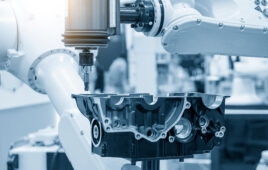Technology is transforming Italian machinery in every industry, from new hardware and software to new materials and processes.
Italian companies are investing in creating more powerful and longer lasting batteries, 3D sensors and other quality control systems for developing new e-mobility motors, energy saving designs and advanced software for improving textile manufacturing and recycling. Explore how these technology advances are shaping the future of machines and manufacturing around the world.
Green Power
To fully support international environmental goals, COMAU SpA is developing cutting-edge energy solutions that increase performance while lowering overall environmental impact. From high-performance battery manufacturing solutions for the naval, automotive and many other industries, to automating the production processes for wind, solar and hydrogen systems, Comau is helping empower green energy worldwide.
Comau’s history of solving challenging technical problems goes back almost 50 years. Founded in 1973 by a group of Italian engineers based in Torino, by the mid-1980s the company had already developed the first robotized automation system and the first hydraulic robot. Comau’s innovations in electrification, digital intelligence, advanced robotics, mobile technologies and smart factory enablers form the backbone of its commitment to empowering green energy supply, storage and transformation, helping promote and enable a cleaner, more sustainable future.
Leveraging its strong history of applying advanced research and innovation to manufacturing processes within mission-critical industries, Comau is also becoming a trusted point of reference for solar and wind energy, in addition to other renewables. Since wind and solar energy are expected to drive the renewable energy market over the next several years, automation can play a decisive role in operations and maintenance, as well as components manufacturing.
And when one of the top electricity companies asked Comau to help design a revolutionary approach to solar panel installation, its engineering team was quick to respond. Today, in addition to automating the outdoor installation of photovoltaic panels directly in the field, Comau has extended its focus on solar energy by developing a novel solution for the on-site production and assembly of solar blades.
Similarly, Comau developed an automated manufacturing system to produce 100+-meter-long wind turbine blades that helps reduce production costs and lead times, allowing wind power suppliers to better meet market demands. The project combines multiple articulated Comau robots with an overhead gantry system to automate the gel, glass fiber layup and gluing processes for the blades.
Comau has also begun developing automation solutions for the hydrogen sector to help facilitate the creation of reliable, zero-emission power. Hydrogen use is expected to double over the next decade, largely driven by new applications in mobility and energy storage. This should also boost the demand for electrolyzers from an estimated 120 MW installed in 2020 to more than 20 GW expected in 2030. The market for fuel cells could grow from a few thousand fuel cell units deployed in 2020 to 1.2M units by 2030, equivalent to more than 100 GW of hydrogen energy.
To achieve this goal, Comau is working toward lowering the price point of fuel cells and electrolyzers by developing a proprietary solutions portfolio that automates key process steps, including cell preparation and stacking, leak testing and more. By industrializing the largely manual manufacturing environment, it can help fuel cell manufacturers scale-up production volumes and increase the quality of the high-precision process. Automation should also reduce operating costs by up to 20% due to increased precision and the reduced burden of cleanroom security measures.
Comau has also developed solutions for the automated production of lithium-ion battery modules for the naval sector that allow Leclanché, a company specializing in the production of lithium-ion cells and energy storage solutions, to increase its work capacity by up to six times. The solution both automates complex manual processes and reduces operating costs by up to 20%.
For energy transition to be truly sustainable, it is also necessary to manage the end-of-life environmental impact associated with batteries used to power ships, trucks, heavy rail and passenger vehicles. Comau has joined the “Battery regeneration project” and the Flexible Battery Dismantling (Flex-BD) project, working together with other partners to automate battery dismantling operations.

Comau robots in action
E-mobility motors
The transition to e-mobility is a major technological change for car manufacturers, who have to install new production lines and new quality control systems for electric motors. MARPOSS SpA has a 70-year history in the field of quality control for the automotive industry.
Electric mobility has been a driving force behind the introduction of new measurement technologies, such as optical gauges, that are necessary to meet the changing needs of the industry. The traditional product lines are now complemented by new applications of optical technology for the components of the electric drive unit.
All vehicle manufacturers are accelerating their e-mobility development activities, according to UCIMU-SISTEMI PER PRODURRE, the Italian Industry Association for Machine Tools, Robotics and Automation. As a result, the distance between R&D phases and a production launch is shrinking, which makes it increasingly necessary to control components in the phases where they are continuously revised and updated.
The flexibility of optical gauges is a crucial asset, as they can measure components of different shapes and sizes within very short cycle times. Optocloud 3D sensors from Marposs can perform more complex controls, such as in the case of electromobility, that are related to dimensional control and the inspection of the assembled stator, before or after the twisting operations and subsequent welding of the ends of the hairpins.

Optoflash, an optical measurement system for shafts
Innovating Fabrics
MARIO CROSTA Srl is a world leader in the production of textile finishing machinery. With the adoption of increasingly advanced technologies, textile machines are radically changing the way products are manufactured, enabling faster and more efficient production. The advent of the technological revolution has changed the company, reducing the manual workforce and increasing the research and development department, so that it remains a pioneer in developing machinery.
There are many advantages for textile manufacturers to this technology leadership, including the ability to produce customized and innovative fabrics. In 1981, Mario Crosta was the first company worldwide to apply newly released and updated inverters to its textile machines, guaranteeing a huge competitive advantage over others in the industry.
In 1993, a milestone was reached when Malden Mills, Ma. (later named Polartec) decided, after years of research, to rely on Mario Crosta to launch the revolutionary and never-before-seen Polar Fleece fabric into the market, which has marked the world of fashion for the last 30 years. Since then, many global companies have contributed to the widespread diffusion of these high-tech, high-performance fabrics, especially in the military and sports fields.
This collaborative model remains the cornerstone of the company’s new machine designs, enabling it to innovate in the fields of sustainability, digitalization and technology (S-D-T), also key themes of the Italian machinery association ACIMIT, Association of Italian Textile Machinery Manufacturers, where CEO Mario Crosta is a board member.
The company’s Energy Saving System (ESS) is an electronic configuration that allows energy savings of up to 35 to 55%. It enables energy sharing and recycling, using advanced software and state-of-the-art technologies to create machines whose electronic components are designed and built in-house.

Polaris-28 machine
Recycling Textiles
A circular economy and recycling, as well as sustainability, are very important topics today in all industrial sectors, but particularly in the textile industry where Mesdan SpA has introduced new solutions.
To reduce textile wastes and the consequent environmental pollution, international directives demand textile mills use a certain percentage of recycled fibers in their spinning process. But fabric shearing and shredding stresses the fibers, reduces their original length and makes it extremely difficult to spin a 100% recycled fiber composition.
For downstream processes, and particularly for ring spinning technology, it is necessary to blend in virgin fibers with a length that allows them to be spun in traditional machines. As well as the analysis of the recycled fiber features, an experimental study of the blending and testing of fibers with different technical characteristics, and blending them with different composition percentages, is required.
The Mesdan-Lab “Mini Spinning Line” can quickly perform those trials on a small scale by processing only 50 grams of fiber, with small machines occupying a compact space, consuming minimal power and raw materials. This permits different testing to identify the best blending approach, which is then reproduced in large scale production.
Mesdan equipment is frequently used to test the spinnability of new natural fibers of vegetable origin, like bamboo, ramie, abaca, kenaf, pineapple, milkweed, and fibers derived from birch bark or coconut palm leaves and other plants. Additionally, fabric wastes of expensive fibers like carbon or aramid can be recuperated and spun again, then blended with other spinnable fibers.
Small volumes of trashed garments and most textile production can also be processed to obtain additional fibers for lab scale recycling R&D projects.
Electric vehicles and textiles are two major industries where Italian electronic technologies are transforming how machines and people work. Both industries are also focused on developing circular economies, which will reduce levels of pollution and improve the health of millions of people around the world.
Filed Under: SPONSORED CONTENT




